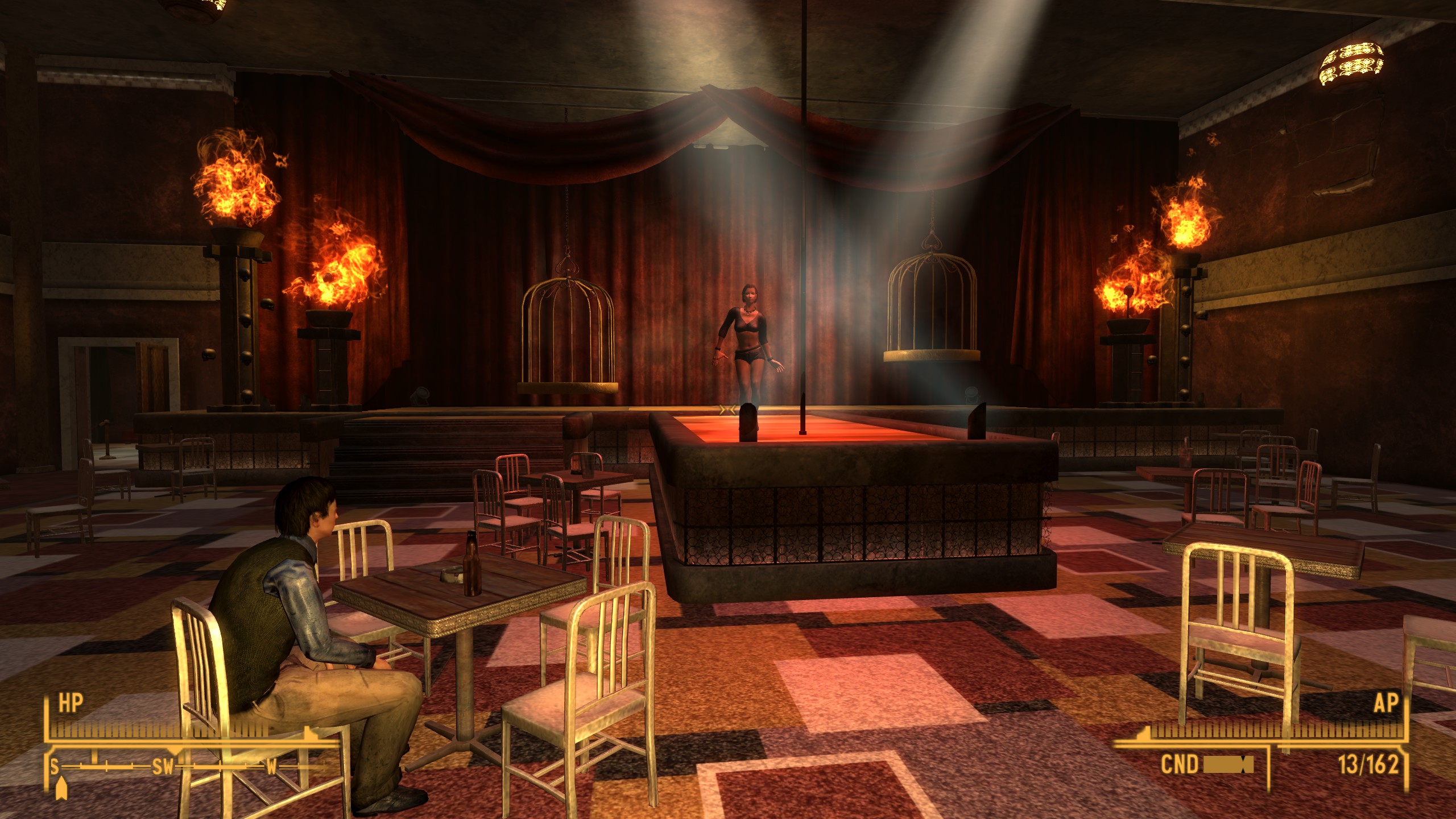click here to return to the main page!


Fallout: New Vegas should really suck. It was made by Obsidian Entertainment, a team who'd never worked on a Fallout game before with an extremely short development period of only 18 months (which is insane to think about when you consider that Starfield took 8 YEARS!!). Despite the odds being stacked high against it, New Vegas released to critical acclaim, and is considered by many to be the best Fallout game to date. It's truly mind-boggling that Josh Sawyer and his team were able to create such a rich, developed world crammed with so content in such a short amount of time. It's fluid approach to role-playing makes Fallout 3 & 4 feel so shallow in comparison that they're almost unplayable.
New Vegas is able to seperate itself from its contemporaries through it's detailed approach to player choice. When you begin the game, your character, The Courier, has just been shot in the head and remembers nothing. Other than this fact, they're a complete blank slate. The first thing the player does is customise their character, and they're then taken through a series of personality tests by the doctor who saved you. In reality, these tests are a guise to allow the player to allocate skill points and choose perks, but the personality-focused framing provides the player with the perfect opportunity to consider who they want THEIR courier to be. Are they a well-behaved citizen who's proficient with a sniper? or a maniac obsessed with explosives? You can build whatever kind of character you'd like. There's even agency in the player's narrative motivations. Fallout 3 has the player character willingly leaving their Vault to brave the wastelands in search of their missing father. This immediately burdens the player with various undeniable factors that must be true about their character; they're brave enough to leave the vault, they care about their father, and they WANT to leave the vault. Even Fallout 1 knows to avoid this; it opens with you being randomly assigned as the vault dweller who has to brave the wastes, whether you want to or not. In New Vegas, the players motivation is simple - to find the guy who shot you in the face. The reasoning behind your motivation can even shift based on what kind of character you choose to play as; maybe your courier wants answers, or maybe they couldn't care less, and just want revenge. Even the way the player navigates space isn't binary; as you leave Goodsprings (the starter town) it's only a short walk to New Vegas. However, most NPCs you've met so far recommend you go the long way around, as the shortcut is perilous. If players attempt to take the shortcut, they'll immediately realise it's way too dangerous, and opt to turn around. Even though this is the expected decision for a player to make, the fact that another option was provided, evaluated and decoded against adds an extra layer of player involvement that Bethesda's Fallout entries sorely lack. New Vegas intentionally avoids forcing the player along a narrative path they don't willingly seek out; a principle that Bethesda desperately needs to learn from.
When you set out to find your killer, you'll run into a wide variety of different NPCs, most belonging to some kind of faction. The two big-hitters are the NCR and Ceasar's Leigon, who are fighting for power in the Mojave. There's also independent figures like Mr House and Yes-Man, alongside smaller factions scattered throughout. By the time you finally track down your killer, the player likely will have aligned with one of these factions. The player's stakes in the conflict in the Mojave develop as they achieve their initial goal (tracking down their killer), which allows for an elegant re-adjustment of the narrative to focus on the Battle of Hoover Dam. The NCR, Ceasar's Leigon, Yes-Man and Mr. House all have their sights set on the with the intentions to occupy it. Whoever the player decides to assist ultimately comes out on top. The faction the player chooses isn't a shallow one to determine and endin - it has impacts on the entire final half of the game. Siding with the NCR, for example, will cause Ceasar's Leigon to send hit-squads after the player as they're traversing the desert, making navigation significantly harder for them (those hit squads beat my ass!!). Any areas occupied by Ceasar's leigon also become much harder to navigate, as all the NPCs will attempt to kill the player on sight. The player is also able to act on their alliances in ways not directly prompted by the game's missions. You're able to kill every single NPC in the Mojave. I ultimately ended up siding with the NCR, and when Ceasar sent one too many hit squads after me I decided to storm his base and beat him to death. The game accommodated for this, and afterwards I would overhear NPCs discussing his passing and it would come up in certain conversations. My action had an active reaction on the world around me, acting as a sort of reward for roleplaying in the way I wanted to.
I could easily make this entry extremely long by discussing the different characters, missions, locations, weapons and DLCs but that would take too damn long!! I have like 40 games to write about!! The player choice and roleplaying flexibility was easily my favorite aspect of New Vegas. It almost feels like a foundation or philosophy on which the rest of the game is built; you'll struggle to find a mission with an outcome that isn't impacted by a player's choice. Also has great LGBTQ+ representation!! Arcade and Veronica being passively queer without it being exaggerated/central to their character is nice to see in a game that comes from an era defined by grungy masculinity.



